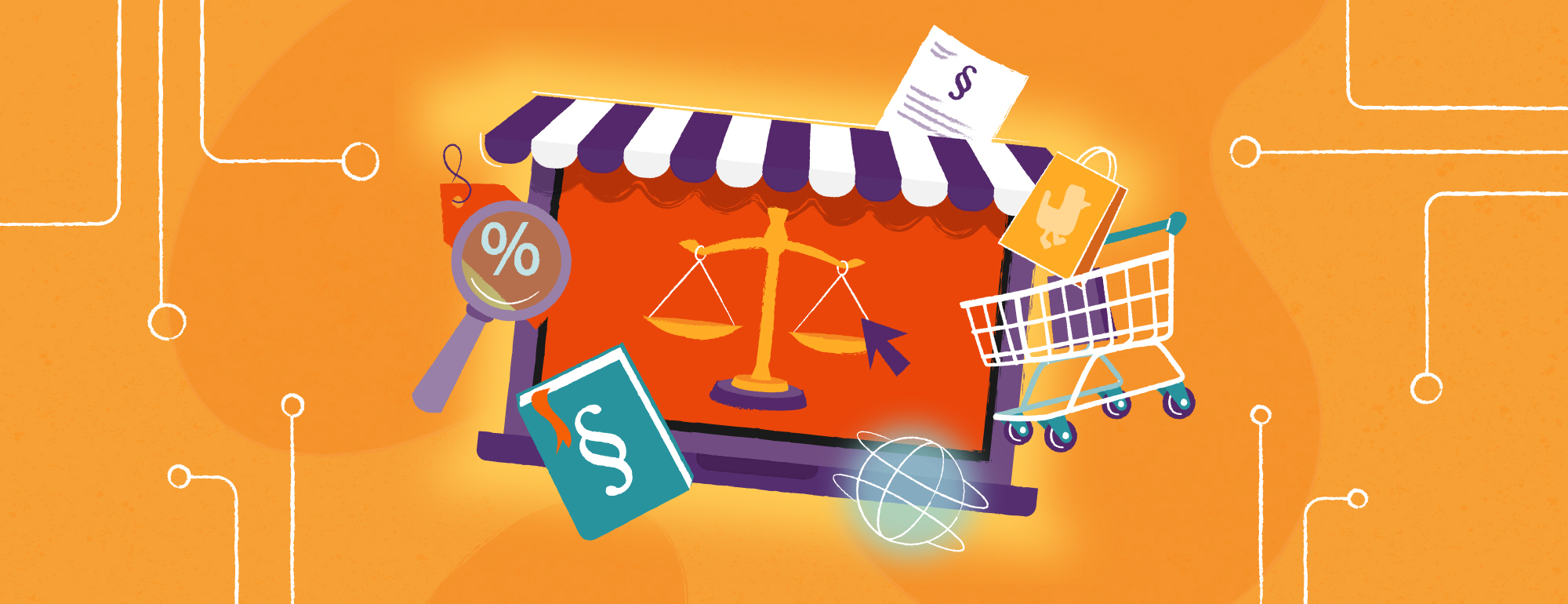New Legislation / E‑commerce 2025
The year 2025 will bring significant changes to e-commerce regulations, which could greatly influence how online stores operate across the European Union.
These updates aim to protect consumer rights, promote transparency, and support sustainable development. However, they also call for businesses to invest and plan for modernization. Let’s take a closer look at the key e-commerce regulations you’ll need to know about in 2025.
General Product Safety Regulation (GPSR)
In May 2023, a new regulation called the General Product Safety Regulation (GPSR) was introduced to enhance product safety. Its main goal is to protect consumers’ health and safety by establishing modern rules tailored to the realities of online commerce and global supply chains.
This regulation, coming into effect on December 13, 2024, brings new responsibilities for manufacturers, importers, and distributors who sell consumer products in the EU. Now is the time to ensure compliance with these new standards.
What Does This Mean for Online Sellers?
With the growing popularity of online shopping, GPSR sets specific requirements for e-commerce sellers. Every product listed online must have clear and transparent descriptions, including:
- Manufacturer information – full name or company name, registered trade name or trademark, and postal and electronic contact details.
- Product details – images, type, model, or other identifying information.
- Safety warnings – clear, visible safety messages included on packaging or in accompanying documents.
Handling Defective Products
If a product poses a risk, manufacturers, importers, or distributors must act quickly by:
- Removing the product from the market,
- Offering one of the following to customers:
- Repair,
- Replacement with a safe equivalent,
- A full refund.

European Accessibility Act
Imagine a world where everyone, regardless of their abilities, can easily access digital technologies. This vision will become a reality with the European Accessibility Act (EAA), set to transform the accessibility of digital products and services in the EU starting June 2025.
The new Act of April 26, 2024, requires manufacturers, importers, distributors, and service providers to ensure that product information (e.g., descriptions, instructions) and e-commerce services are accessible. Microenterprises are exempt from some of these requirements.
WCAG 2.1 Guidelines
The backbone of these accessibility regulations is the WCAG 2.1 guidelines (Web Content Accessibility Guidelines), which define how to create accessible web content.
WCAG 2.1 is built on four main principles.
Perceivable
Content should be accessible through multiple senses. For instance:
- Use alternative text for images to help screen reader users,
- Ensure strong contrast between text and background,
- Allow text resizing without losing readability.
Operable
Websites must work for users relying on various technologies. This includes:
- Keyboard navigation,
- Avoiding flashing content that could trigger seizures,
- Clear and intuitive interactive elements.
Understandable
Content and navigation must be user-friendly. Key points include:
- Simple, clear language,
- Predictable page behavior,
- Logical content layout.
Robust
Websites must be compatible with a wide range of devices and technologies, including browsers, screen readers, and mobile devices.
Why Accessibility Matters
Making your website WCAG 2.1 compliant isn’t just good practice; it also offers tangible benefits:
- Reaching more people: an accessible website opens doors to a broader audience, including those with disabilities.
- Legal compliance: in many countries, compliance with WCAG 2.1 is mandatory for public and government services.
- Boosting your reputation: demonstrating inclusivity shows customers that your business values equal access.
European Green Deal / Sustainable Development Regulations
The European Green Deal is the EU’s ambitious strategy to become the first climate-neutral continent by 2050. This initiative addresses climate change challenges and aims to transition the economy toward sustainability.
How E-commerce Fits In
E-commerce businesses are expected to lead by example, educating consumers about eco-friendly choices and carbon footprints. Zero-emission logistics, sustainable delivery options, and waste reduction are increasingly important.
Digital Product Passport (DPP)
The Digital Product Passport (DPP) aims to revolutionize how products are perceived. It’s a digital document that provides key details about a product, such as its origin, materials, environmental impact, and disposal instructions. This initiative, under the Ecodesign for Sustainable Products Regulation (ESPR), will make this information available to consumers in digital form.
The initiative was introduced as part of the Ecodesign for Sustainable Products Regulation (ESPR), which stipulates that almost all products sold in the EU will have to have a Digital Product Passport. The regulations will also need to be met by non-EU manufacturers if they want to offer their goods in this market.
The DPP will provide consumers with detailed information about products, including:
- The source of raw materials and the exact composition of the products.
- The carbon footprint of the product.
- Safety certifications and compliance with standards.
- Recycling options.
- Guidelines for disposal of goods.
DPP / Implementation
Although ESPR has not yet come into force, many businesses are already implementing solutions inspired by the DPP idea. It is also a response to customer expectations – as many as 80% of millenials and 66% of Generation Z representatives say that environmental issues influence their purchasing decisions.
The implementation of the Digital Product Passport is scheduled for 2026, so this is the best time to prepare for these changes. To begin with, the regulations will cover products in categories such as electronics, batteries, and textiles. In all likelihood, the regulations will soon be extended to the construction sector, and then to more industries.
A key tool supporting the implementation of this solution is the PIM (Product Information Management) system, which allows for the effective management of extensive product data. With PIM, companies can collect, organize and share detailed product information, and distribute it to all sales channels.

Artificial Intelligence Regulations / AI Act
The year 2024 certainly belonged to artificial intelligence. Where there are tremendous opportunities, there must also be appropriate regulations.
The AI Act, or the Artificial Intelligence Act, is the world’s first comprehensive guidance on rules for the design, implementation and use of artificial intelligence systems. Prepared by the European Union, the document seeks to balance technological innovation with the protection of human rights and user safety. The draft regulation, presented in April 2021, is expected to come into force in 2026, while selected regulations, including general provisions and prohibited practices for AI, will be applied as early as 2025.
Balancing Innovation and Regulation
The AI Act aims to:
- Protect user safety and rights,
- Encourage innovation through clear guidelines,
- Mitigate risks from high-risk AI applications,
- Build trust in AI technology.
Artificial Intelligence in Practice
Observing our clients’ growing interest in artificial intelligence-based solutions – from recommendation systems and virtual assistants, to tools integrated with PIM systems that automate the creation of product descriptions and advanced analytical tools – we can clearly see how AI is revolutionizing automation, personalization of offers and resource savings. This rapid development indicates that artificial intelligence will play an increasingly important role in business strategies.
At the same time, the AI Act, while designed to provide a safe and trusted environment for the deployment of artificial intelligence, is evoking mixed reactions. A key challenge is the risk of stifling innovation – overly stringent regulations could not only slow the development of AI in Europe but also prompt e-commerce entrepreneurs to relocate outside the EU, where the way artificial intelligence is used is not restricted.
Digital Services Act and Digital Markets Act
The EU has introduced the Digital Services Act (DSA) and Digital Markets Act (DMA) to address challenges posed by large online platforms and ensure a fair digital market.
Key Responsibilities for Platforms
- Tackling illegal content: platforms must quickly remove illegal content and provide clear appeals processes.
- Algorithm transparency: users must be informed about how content recommendation algorithms work and offered non-personalized display options.
- Risk reporting: very large online platforms (VLOPs) must analyze and report risks such as disinformation and privacy breaches.
- Consumer protection: practices like dark patterns (misleading interface designs) are prohibited.
The DSA came into effect on November 16, 2022, with VLOPs required to comply by August 25, 2023. Ensure your platform meets these standards.
E-commerce 2025 / A Chance for Growth
The 2025 e-commerce regulations may seem challenging at first, but they also offer exciting opportunities.
Adapting to these changes allows businesses to build trust, demonstrate transparency, and show commitment to sustainability. Early compliance can help you avoid penalties and position your company as a leader in innovation.
Don’t wait until the last moment – start preparing your business now. Every challenge is an opportunity to set new standards and inspire others. Is your company ready to lead the way?







